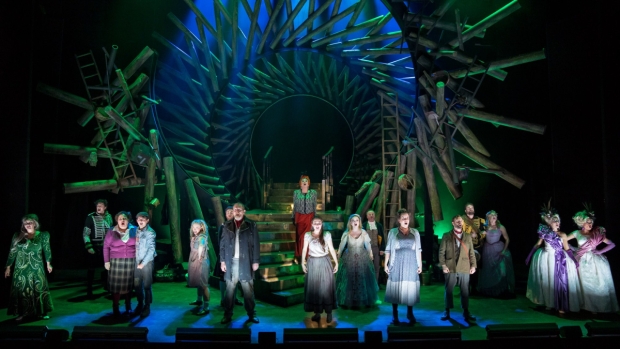Into the Woods at the Lyric Theatre – review
The much-loved Sondheim/Lapine musical continues its run until 27 February

© Steffan Hill
Despite some ravishing numbers and complex choral sections, Into The Woods remains a surprising choice for an opera company, especially when compared with the epic sweep or atonal sophistication of other Sondheims, such as Sweeney Todd, Pacific Overtures or Passion. That said, the Royal Opera managed an excellent version at the Linbury Studio in 2007, but that was cast strongly with visiting musical theatre veterans. This enjoyable Northern Ireland Opera production goes down a similar route, with sometimes unexpected results.
It's a joy to hear Jonathan Tunick's original Broadway orchestrations again, and how they shimmer and sparkle: when the whole company regroups to deliver the title song, which pastiches the rum-ti-tum-ti rhythms of nursery rhymes before breaking off into fiendishly clever harmonies, the aural assault thrills the blood. But it's the book scenes (James Lapine's quirky, darkly funny script has seldom been served so well) and some of the individual characterisations that really impress and surprise.
In all honesty, director Cameron Menzies stages the iconic moments, such as the Witch's transformation or "Last Midnight", her magically apocalyptic warning of doom to come, with little flair or originality. The constant physical acting out of lyrics that really can speak for themselves, becomes tedious, as does Jennifer Rooney's plodding, enervating choreography. Yet there's real, haunting anguish in Cinderella's parting from her faithless Prince, or the realisation by Jack (of beanstalk fame) that his Mother has passed away. What this solid staging lacks in flamboyance or inspiration, it often makes up for in emotional authenticity.
You know you're watching a Sondheim musical when the curtain rises on act two (for the uninitiated: act one sees familiar fairy tale characters heading into the woods to sort out their stories and attain their Happily Ever After in the act one finale …the second half is what happened next) to reveal a bunch of disgruntled characters singing about how they never thought they could be this happy, and all through gritted teeth. Melodically lovely though much of the music is, it's the brilliance of Sondheim's lyrics that really distinguishes this score. The rather hackneyed notion that Sondheim's work, however ingenious, is somehow chilly and lacking emotion is blown out of the water by the heart-catching simplicity of the bereaved Baker's duet with his estranged father, "No More", which is surely as moving an expression of loss, despair and ultimately acceptance as was ever written. Alastair Brookshaw and Sean Kearns, as son and father respectively, mine this number for all its hurt and regret: it's a beautiful version.
Elsewhere, Kelly Mathieson's steely but exquisite Cinderella is a more pragmatic, less immediately endearing reading of the role than we might be used to but it's one that actually makes perfect dramatic sense and pays off richly later as she transitions from grief-stricken girl to empowered woman. Plus her voice is utterly gorgeous. Mary McCabe's sepulchral Rapunzel fields a coloratura so exhilarating that it's a shame they didn't keep in the "Our Little World" duet for her and the Witch that was created for the original London version. Rory McCollum brings a superhero-like swagger to her feckless Prince. Allison Harding adds a plaintive, raw quality to some of the Witch's later, heartbroken solos that is supremely affecting, even if she is a little subdued in the first half: more vaguely cranky than comically diabolical.
Conor Quinn and Wendy Ferguson as clueless Jack and his exasperated Mother are pretty much perfect, and Peter Hannah gives a quirky, neurotic sensibility to Cinderella's awful Prince ("I was brought up to be charming, not sincere") that strikes comic gold. Sinéad O'Kelly's deeply lovable, unsentimental Baker's Wife is the beating heart of the story, and when she is posthumously described as the lynchpin holding everything together, it rings entirely true.
If the ending, including the standard "No One Is Alone", veers towards sentimentality (certainly not an accusation one could make of Sondheim's earlier works) that cosy acceptance is still hard won. James Lapine's book bravely confounds expectations by killing off arguably the most relatable character halfway through act two, and even if you're familiar with the show, that moment remains shocking – although indifferently staged here – and casts a long melancholy shadow over everything that follows.
Niall McKeever's set of an imposing central staircase engulfed by concentric circles of tumbling wood is attractive and atmospheric but limits the playing space, and doesn't transform as the principal character's whole world literally falls apart. Kevin Treacy's terrific lighting goes some way to addressing that, employing shards and flashes of illumination to often enthralling effect.
Even if this is a good, not a great, production that soars only intermittently, it is a potent reminder of what we lost when Stephen Sondheim died late last year. Despite a few flaws, Sondheim aficionados will find much here to enjoy, and newcomers to his work will realise unmistakably that they're in the presence of greatness. "There are giants in the sky", as Jack sings in one of the stand-out numbers, but look at the legacy one of them has left us down here on earth.












